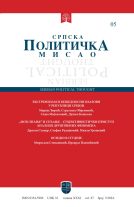- Home page
- Researchers
- Nebojša Petrović
Nebojša Petrović
Department of Psychology, Faculty of Philosophy, University of Belgrade

RECENT SERBIAN LITERATURE AS A REFLECTION AND AGENT OF THE POLITICAL ENVIRONMENT
This manuscript inquires into the intricate relationship between Serbian literature and the political environment from 1991 to 2021, highlighting how literature not only reflects societal conditions but actively shapes political and cultural discourse. It examines the dual role of literature as both a product of its time and a powerful tool for influencing collective memory and social values. The analysis begins by referencing Plato’s critique of poetry in The Republic, where he perceives literature as a mere imitation of reality, inferior to the world of ideas. However, the manuscript counters this view by emphasizing the significant impact literary works have had throughout history in shaping political ideas, social movements, and the destinies of nations. The manuscript underscores how literature and politics are mutually constitutive, with literature serving as a reflection of the political context in which authors live and create. It argues that through their works, writers provide insights into historical epochs, helping readers understand social changes and processes. Literature does not only mirror the political environment but can also be an active participant in shaping it, functioning as a cultural force that socializes generations of citizens. Several examples from Serbian and world literature illustrate how literary works have influenced political realities. For instance, Stowe’s Uncle Tom’s Cabin played a crucial role in shaping public opinion against slavery in the United States, while Orwell’s 1984 and Huxley’s Brave New World have had a profound impact on political thought, warning against the dangers of totalitarianism. In the Serbian context, the works of authors like Dobrica Ćosić and Borislav Pekić are highlighted for their significant influence on the national consciousness and political thought. The manuscript discusses the role of literature in times of political crises and upheavals, noting how Serbian writers have often been politically active, with many participating in political movements and organizations. It also touches upon the ideological conflicts within Serbian literature, where different groups of writers are divided by their views on national identity, traditional values, and the role of history in contemporary society. Moreover, the manuscript explores how literature serves as a space for exploring broader themes, using political context as a backdrop. Writers often use fiction to delve into deeper questions, employing symbolism, metaphors, and layered narratives to express political ideas while leaving room for diverse interpretations. This allows literature to remain a potent force in political socialization, subtly shaping readers’ beliefs and attitudes. The manuscript also addresses the dynamic interplay between the socio-political environment and literature, emphasizing how social circumstances influence writers and the themes they explore. During times of significant social change, such as the breakup of Yugoslavia, Serbian literature has reflected and critiqued the evolving political landscape, offering unique narratives that resonate with the collective experiences of the people. In conclusion, the manuscript asserts that literature, born from a specific socio-political context, not only reflects the realities of its time but also has the power to shape values, ideologies, and perceptions of social order. Through its rich and layered storytelling, literature invites readers to critically examine societal norms, history, and ideological constructs, potentially altering their views and contributing to the broader cultural and political discourse.

Leisure Patterns and Values in Adolescents from Serbia born in 1990s: An Attempt at Building a Bridge between the Two Domains
This work is an attempt at empirically establishing a relation between leisure and values in adolescents. Being new, this topic could help a broader understanding of youth leisure and its association with inner psychological dispositions, but also with specific social context (prolonged economic crisis and post-war environment). Five typical leisure patterns were previously identified: academic, sports, going out, following celebrities in the media and music, and computers pattern. The main objective was to discover whether students with high and low scores on these patterns differ regarding their values. The sample consisted of 2426 Serbian secondary school students from 9 towns. A discriminant analysis was performed and showed that it was possible to identify a specific mix of personal and social values for every leisure pattern. This confirms the existence of a relation between students’ behaviour during free time and their values, expressed as a preference for specific personal and social goals. The resultss imply that connecting two domains is achievable and fruitful in both ways. The identified leisure patterns contribute to a more detailed and elaborate portrayal of adolescents’ values but those values also bring a new insight into specific features of adolescents' behaviour during leisure time.
